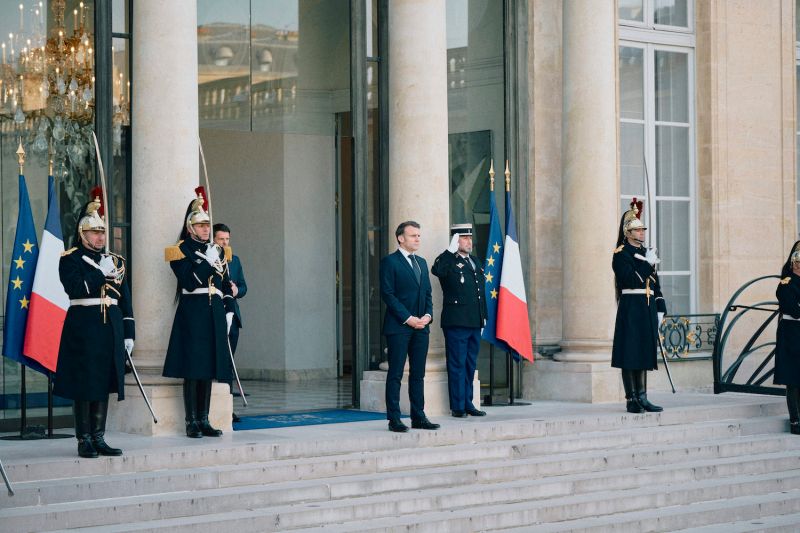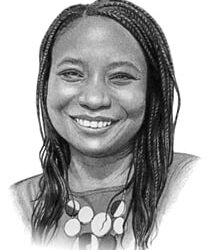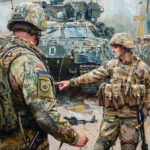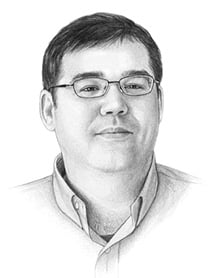Europe’s Top Leaders Meet in Paris to Stay Relevant

Europe’s Top Leaders Meet in Paris to Stay Relevant
As U.S. and Russian officials begin negotiating an end to the Ukraine war without them.
French President Emmanuel Macron welcomes leaders to the Cour d’Honneur of the Élysée Palace for the Ukraine and European security summit in Paris, on Feb. 17. Benoît Durand/Hans Lucas via AFP
A group of European leaders convened in Paris for an emergency meeting on Monday, still reeling from a weekend during which their long-standing ability to rely on the United States for support was thrown into question and ahead of a meeting between U.S. and Russian representatives in Saudi Arabia that they were excluded from.
Monday’s emergency meeting, convened by French President Emmanuel Macron, included the leaders of the United Kingdom, Germany, Poland, Italy, the Netherlands, Spain, and Denmark, as well as European Commission President Ursula von der Leyen and NATO Secretary-General Mark Rutte. It came close on the heels of the Munich Security Conference, where U.S. Vice President J.D. Vance gave a speech accusing European countries of straying from “democratic values” over their opposition to far-right political parties and what Vance characterized as excessive censorship.
A group of European leaders convened in Paris for an emergency meeting on Monday, still reeling from a weekend during which their long-standing ability to rely on the United States for support was thrown into question and ahead of a meeting between U.S. and Russian representatives in Saudi Arabia that they were excluded from.
Monday’s emergency meeting, convened by French President Emmanuel Macron, included the leaders of the United Kingdom, Germany, Poland, Italy, the Netherlands, Spain, and Denmark, as well as European Commission President Ursula von der Leyen and NATO Secretary-General Mark Rutte. It came close on the heels of the Munich Security Conference, where U.S. Vice President J.D. Vance gave a speech accusing European countries of straying from “democratic values” over their opposition to far-right political parties and what Vance characterized as excessive censorship.
His remarks—coupled with U.S. Defense Secretary Pete Hegseth’s statement earlier that week that Ukraine’s membership in NATO was not a “realistic” outcome of a potential negotiated settlement to end the war and U.S. President Donald Trump’s unilateral decision to start direct negotiations with Russian President Vladimir Putin to end the Ukraine war—left many European leaders feeling shocked and sidelined.
In Munich, senior European officials stuck to the central message they have been putting forward for months, despite Vance’s speech and the acknowledgment that Europe must contribute more to its own defense. “There will be no peace in Ukraine without Ukraine or Europe,” Estonian Defense Minister Hanno Pevkur told Foreign Policy on the sidelines of the conference.
But the Trump administration doesn’t seem to be heeding that message. U.S. Secretary of State Marco Rubio and his Russian counterpart, Sergey Lavrov, met in the Saudi capital of Riyadh on Tuesday, where the two sides agreed to begin talks to achieve peace in Ukraine and more broadly improve U.S.-Russia relations. No Ukrainian or European representatives were included, and Ukrainian President Volodymyr Zelensky postponed his own visit to Saudi Arabia scheduled for Wednesday.
“There is now a sort of ideological convergence between Moscow and Washington against Europeans,” said Thomas Gomart, director of the Paris-based think tank Institut Français des Relations Internationales, describing the Trump administration’s stance as a “strategic gift, which has been given to Putin for almost nothing at this stage.”
The problem, even for Europe’s most powerful nations, is that they cannot seem to agree on how to proceed.
Macron, who skipped the Munich Security Conference, has tried to play interlocutor, speaking to Trump before and after Monday’s emergency meeting, when he also spoke to Zelensky. “We will work on this together with all Europeans, Americans, and Ukrainians,” he wrote in a post on X. “This is the key.” France is reportedly planning to host a second meeting on Wednesday with other European nations that weren’t included in Monday’s meeting, as well as North American ally Canada.
U.K. Prime Minister Keir Starmer wrote in an op-ed in the Telegraph on Sunday that he would be willing to commit British peacekeeping troops to Ukraine if a peace deal is reached. Polish Prime Minister Donald Tusk, on the other hand, told reporters categorically on Monday that Poland will not send troops to Ukraine, while German Chancellor Olaf Scholz—facing a snap election next week—said it was “inappropriate” to discuss peacekeeping troops before a peace deal is reached.
“For Europeans, there is this idea that if a cease-fire is really implemented, Ukraine should continue to be supported and maybe Europeans should be able to provide security guarantees,” Gomart said. “Having said that, there is deep division among them regarding the security guarantees, and there is also division in terms of what sort of military risk Europeans are ready to take by themselves.”
Rishi Iyengar is a reporter at Foreign Policy. X: @Iyengarish
More from Foreign Policy
-

A security guard stands at the entrance to the U.S. Agency for International Development (USAID) headquarters on Feb. 3. DOGE Is Hacking America
The U.S. government has experienced what may be the most consequential security breach in its history.
-

A man with a beard in a suit and tie speaks behind a teleprompter. The logo for MSC is behind him. Vance Leaves Europe Gobsmacked
U.S. Vice President J.D. Vance delivered a rebuke on immigration and alleged censorship to a shocked Munich Security Conference.
-

A Palestinian girl carries a child through the rubble of houses destroyed by Israeli bombardment in Gaza City on March 3, 2024. Why Is the World So Polarized on Gaza?
The answer might be linked to race and colonization, explains author Pankaj Mishra, speaking on FP Live.
-

An attendee dressed like Uncle Sam waits for Donald Trump to arrive for a campaign rally at the Mosack Group warehouse on September 25, 2024 in Mint Hill, North Carolina. America Is Its Own Worst Enemy
It’s not unprecedented for a powerful country to simply shoot itself in the foot.








Join the Conversation
Commenting on this and other recent articles is just one benefit of a Foreign Policy subscription.
Already a subscriber?
.
Subscribe
Subscribe
View Comments
Join the Conversation
Join the conversation on this and other recent Foreign Policy articles when you subscribe now.
Subscribe
Subscribe
Not your account?
View Comments
Join the Conversation
Please follow our comment guidelines, stay on topic, and be civil, courteous, and respectful of others’ beliefs.
Change your username |
Log out
Change your username:
CANCEL
Confirm your username to get started.
The default username below has been generated using the first name and last initial on your FP subscriber account. Usernames may be updated at any time and must not contain inappropriate or offensive language.